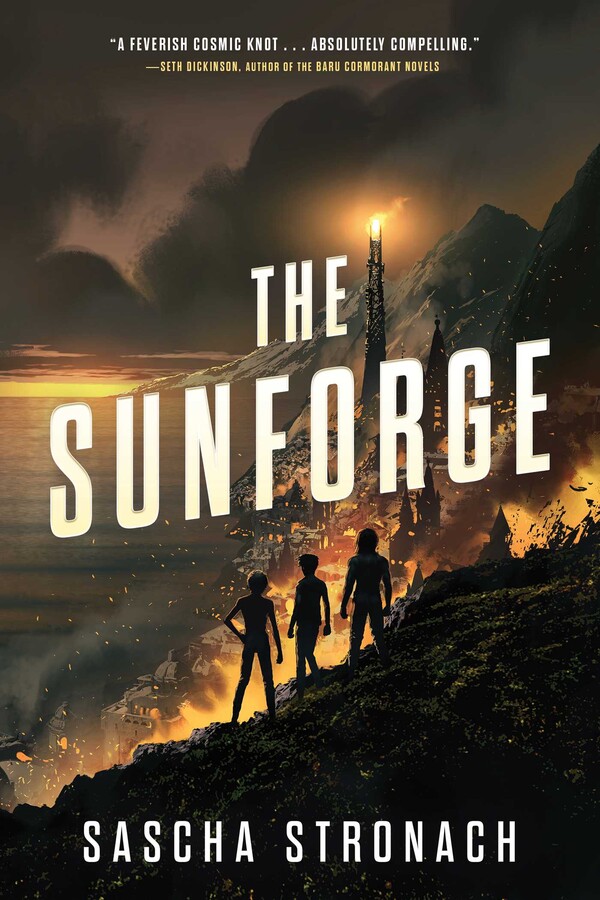Every day, Rose went out beyond the hawker stands –out beyond the torn-up fences and beat-up dock workers– to the place where the water was clear. Every day, she went to the ocean to weep. The siyokoy took her son when he was out swimming: the niños ate her little niño. She would cry, and scream, and strike the water with her fists. Then, she would return home and cry, and scream, and strike her remaining sons while they cowered in the corner. If you’d asked her, she couldn’t tell you why.
Patti saw, and didn’t know what to do. She watched and hid in trees, on rooftops, behind a jumble of TV aerials. She walked on her hands to keep a low profile, and kept her wings hidden in the small of her back. Her guts got dirty as they dragged along the ground. When Rose wept, Patti wept too. She couldn’t tell you why.
Patti wasn’t a siyokoy. She hadn’t even been nearby when little Alberto got dragged down and eaten up – she was off in Cebu, lurking around a maternity ward. The modern world was good for manananggal: they put all the pregnant women in one place. Patti could spread her feeding around, and not hurt a soul. Her neighbours knew what she was. One of them would hang crucifixes all over the damn place and the apartment hallway always reeked of burning sage, but they left her alone.
She didn’t swoop down on them in the dead of night; they didn’t hunt her through the jungles with spears. They told their friends about the monster next door but never said anything to her face; she smoked weed and listened to old punk records, and only fed when she needed to. She followed Rose out to the docks every day she could, and watched, and wept.
It was near the end of the dry season when it happened. Patti sat on Mr Nunes’ balcony smoking a cigarette and listened to Rose shouting at her boys. She leaned across and peered in the window, and one of the boys (Lucas, the tall one, with his shaggy mop of hair) peered back. He was backed in a corner, almost in a squat. Patti had seen a lot of human faces. She’d seen them scream, or go white, or (in more recent times) turn away muttering a prayer. She had never seen this– Lucas looked her dead in the eye, plaintive, and mouthed a single word.
help
While she stared, Mr Nunes ran up and hit her with a broom. She hadn’t even seen him coming. “Aswang!” he shouted “go away! Get out of here, Tik-Tok!”
She took flight while Mr Nunes shouted some bullshit about Our Mother Mary. She hung in the air for a moment, hissed at him, then gave him the finger and swooped off into the night.
***
Every day, Patti followed Rose down to the water. Every day, she remembered Lucas’ sad eyes and crept a little closer. As the dry season came to a close, Cadiz was going insane– after six months without rain, a sick pressure builds in the air that makes men wish for a flood. Patti felt it in her skin, and in the space between her eyes. Rains made it harder to fly, but also easier to move around undetected. She knew in another six months she’d be praying for the rains to stop. Funny how that worked. Patti had left her legs behind: lower profile, harder to be seen. She had a good view of Rose from the roof of the Port Authority office. A dock worker noticed her, made the sign of the cross, then went back to stacking boxes. She took a deep breath, and swooped down.
She wanted to scare Rose– to bite her and scratch her. She spread her wings wide, and bared her sharp teeth, and opened her mouth to roar. Rose turned, and saw. She did not scream, or go white. Her eyes were plaintive, and filled with tears. Patti lowered her hands, only a little. Her jaw hung open.
“Are you going to kill me?” said Rose.
It wasn’t fear: Patti knew fear. It was almost begging.
“No,” said Patti. She slumped, and let her guts touch the sand.
“So,” said Rose, “we’re monsters.”
She stared out to sea. The sun hung low over Cadiz, and painted the clouds in fire-orange and bruise-purple. They sat in silence. Patti took out a cigarette, then realised she’d left her lighter in her pants. Without speaking, Rose proffered a green plastic Bic lighter, and lit the cigarette.
Patti smoked it down to the filter, then held it between her thumb and forefinger and flicked it into the ocean. It floated, and sent ripples out into the water.
“We don’t have to be,” she said. “The world hurts. It hurts in big ways and it hurts in small ways, and it twists your spine until you find yourself hurting it back. That’s the trap. You’ll hurt your sons, and they’ll hurt their friends and their wives, and their wives will hurt their sons and it’ll keep on hurting until the clouds and the rapture takes us all.”
“You think it’s that easy?” said Rose. “Just stop hurting?”
“No,” said Patti. “It’s the hardest thing I ever did.”
Rose didn’t reply. They sat, and watched the sun set. Patti took out another cigarette. It was the last one in the pack.
“You never really quit,” she said. “You just go longer between relapses.”
“Cigarettes?” said Rose.
A pause hung in the air.
“Yeah, sure.”
“Maybe,” said Rose, “that gap gets big enough that you forget what tobacco tastes like.”
“That would be nice,” said Patti. Her voice broke, only a little. “Really nice.”
They sat, and watched another day turn to night. Patti smoked her last cigarette. She left embers in the sand, as the disappearing sun left streaks of fire in the sky.
